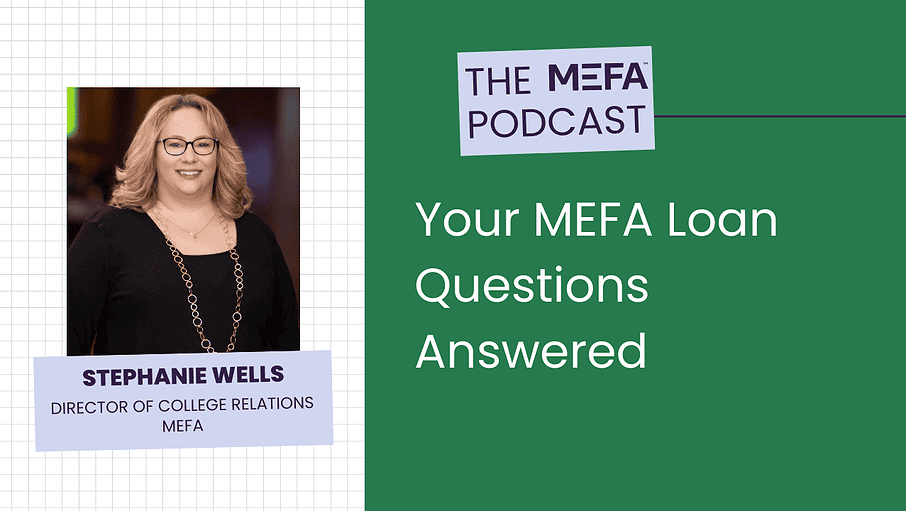Resources Mentioned in this Episode
Jonathan Hughes: [00:00:00] Hi everyone. And welcome to the MEFA Podcast. My name is Jonathan Hughes, and today we have our most frequent guests on the show. I think the first bonafide member of the five timers club on the MEFA Podcast, Stephanie Wells. Hey, Stephanie.
Stephanie Wells: Hi everybody. Hi, Jonathan. Nice to be here.
Jonathan Hughes: Yeah. Good to have you back.
Stephanie Wells: Yeah. I’m feeling like a celebrity with five times on the MEFA Podcast.
Jonathan Hughes: It’s either four or five. I can’t remember exactly which one, but it’s, you’re, We have to have you on because now we’re talking about MEFA loans, right? And so who else would we have on the show to talk about MEFA loans other than Stephanie, our MEFA loan expert.
Every summer you come in and tell us about MEFA loans and about borrowing in general. It’s getting about that time of year where people are starting to look for loans to pay for college for the upcoming year. Let’s [00:01:00] talk MEFA loans, Stephanie. What types of loans are MEFA loans? And how do they work?
Stephanie Wells: The MEFA loan is really considered a family loan or an alternative supplemental type loan. It really is one of those types of loans to pay what you need to on that bill that financially doesn’t cover. So whatever that cost is, whether it’s a family It’s the build costs, unbuild costs, off campus housing. The MEFA loan can cover that, minus the financial aid offer that you received.
Jonathan Hughes: Yeah. That’s a big question that we always get. That’s something I’ve gotten the past week a few times, how does it work to get off campus housing pay? Can you borrow for off campus housing with the MEFA loan? So I know you just said that you can, but how do families go about doing that then?
Stephanie Wells: Yeah, how does that work? So we always recommend that when families apply and they can apply right on mefa.org, it’s an instant credit decision. It only takes about 15-20 minutes to fill out the application. You find out right [00:02:00] away. So you can do all of that right online, but we do recommend apply for what you need for the full year.
Even if it’s for off campus housing or books, I always recommend that if families have a student who’s living on campus, going to school on campus, that they try to limit their borrowing to the build costs and try to pay for some of those out of pocket unbilled expenses like books, supplies, pizza money, transportation out of pocket to reduce the amount they’re borrowing.
However, with some students who might be living off campus, That’s a whole extra expense where families may need to borrow for off campus expenses such as rent, utilities, and food. And you can do that with the MEFA loan as well, but just borrow what you need for the full year. No monies are going to be assessed any interest until the funds are sent to the college.
So it’s okay to borrow for the full year and you can reduce your spring semester loan if you need to borrow less later on, but it’s [00:03:00] good to get that loan locked in for the year because no interest will be assessed till monies are sent and for unbilled expenses, such as off campus housing. We always send all of the money to the college, so the college will take.
Whatever is due on your bill and send the family a refund for those off campus expenses. So you just need to be in touch with the financial aid office if you need a refund for that.
Jonathan Hughes: So another popular question that people have is there a limit? Is there a dollar amount limit that you can borrow over the cost of the entire education?
Stephanie Wells: So there is no aggregate loan limit. So you can borrow what you need for each year. It’s an annual process. Yes. Typically for an undergraduate student, they’re looking at four to five years. So you would borrow each year what you need, a different loan each year, but you can borrow up to the full cost of attendance.
Minus your financial aid offer. So there’s no limits other than the cost of attendance minus aid. There is a minimum loan amount of [00:04:00] $1,500 But there is no real maximum because the college is going to certify the loan to make sure families aren’t over borrowing and they’re certifying To make sure you’re not borrowing more than that cost of attendance minus financial aid.
Jonathan Hughes: Okay, and when do you start to repay MEFA loans?
Stephanie Wells: When do you start to repay? That’s a good, that’s a good question. And the answer can depend on what your monthly budget is. So you really have a lot of flexible options with the MEFA loan. You can start repaying right away. So interest and principal while the student’s in school.
We have two different immediate repayment options, 10 or 15 years. That’s going to be the lowest cost option with the lowest rate. And you’re paying interest in principle while the student is in school, so you’re lowering your total cost of the loan. However, that does require payments while the student is in school.
And for some families, they may need to defer payments while the student is in school. And they can do that as well. But [00:05:00] just know that the interest rate might be slightly higher and if you’re not paying principal and interest while the students in school, then it is going to, increase the total cost of the loan over the life of the loan.
But that might be what some families need based on their monthly budget. We also have an interest only option where students and families can pay just the interest while the student is in school to at least delay the cost a little bit now with that said. You can make prepayments at any time. Even if you chose that deferment option to have a flexibility with your monthly payments, you can still make payments on that loan while the students in school and that will help reduce the total cost.
I focus on the total cost a lot with families because I want them to know the worst case scenario about What they’ll pay over the life of that loan. If they make those minimum payments, it’s really important to look at the big picture and project out for years.
Jonathan Hughes: Yeah, no, that’s great. I had some of those questions just this morning from a borrower. So good [00:06:00] to get that out there. What is new with MEFA loans?
Stephanie Wells: The MEFA loan rates for this year just came out in June. So we’re pleased to once again have all of our undergraduate and graduate loan rates below the federal plus loan. So the rates for undergraduate loans range from 5.75% fixed to 8.95% fixed based on the repayment option that you choose and credit rating or credit score of the borrowers. So that’s going to determine your rate. Compared to the Federal PLUS Loan at 9. 08%, Still great deal and there’s no fees on the MEFA loan. Whereas the Federal Plus loan does have an over 4 percent origination fee. So there are costs like that families need to consider when they’re looking at loan options. And the MEFA loan is, historically one of the lowest costs nationwide. for families to take a look at. [00:07:00]
Jonathan Hughes: Yeah. So let’s talk about the PLUS a little bit. What can you tell people about the PLUS loan and how does that compare and contrast to the MEFA loan this year?
Stephanie Wells: So there’s a lot of similarities. There’s a lot of differences. So the big difference for me is the rate because that’s going to drive the cost of the loan. And that is ultimately one of the biggest factors that families need to consider. It has a higher rate than the MEFA loan. But with that said, There are other options out there where, for profit lenders are out there lending and the PLUS loan is, could be lower than those loans.
It is right in the middle, as far as rates go. But it is only in the parent’s name, the Federal PLUS loan, whereas the MEFA loan, the student is on the loan as well as the credit worthy co borrower or co borrowers. The MEFA loan is really more of a family loan, whereas the PLUS loan is strictly a parent only loan.
That’s one bit. Those are two big differences. The rates and who’s the borrower on the loan, as well as MEFA loans don’t have fees. The PLUS loan has over a 4% fee. So [00:08:00] if you are looking at the PLUS loan, you do have to take that into consideration. Now with all of that said, the plus loan can be a good option for families that might have, difficult credit history, or maybe they can’t get approved for a credit based loan like MEFA.
So that might be a good option for them, but it’s not the lowest cost option that’s out there, of course. And there are, other federal benefits to consider with the federal plus loan, but it is a comparable loan as far as being able to borrow a cost of attendance minus financial aid.
It’s another way to pay the bill. With the MEFA loan, a lot of families like the fact that the student is on the loan. So they have shared responsibility, they have a little skin in the game, and having access to the loan, they can help pay loan, the payments when they get out of school if they want to, if that’s the arrangement they have with their family.
And so there is a lot more flexibility there, as well as lots of different repayment options with the MEFA loan as well. And the nice thing about both loans, for both of them, you [00:09:00] can borrow at any not for profit college nationwide. MEFA is a national lender, so you can use the MEFA loan at any state, regardless of your state of residency. It does not have to be connected to Massachusetts, per se.
Jonathan Hughes: That’s a great question. I should have asked that because that is a really common question, and it’s still many times the first question that I get from parents or families who are just becoming aware of this. MEFA and their options in general.
I do want to go back for a second though and talk a little bit more about that origination fee because it’s to be honest It’s the piece that I always forget about when thinking about the plus loan and the MEFA loan So MEFA has no origination fee PLUS has a it’s a 4% origination fee.
Stephanie Wells: Yeah, it’s a 4.224% origination fee that’s deducted from the loan proceeds on that plus loan. So that’s a pretty substantial chunk of change, especially if you’re a family who’s looking at maybe $30 -$20,000- $30,000, 4% of that is a massive amount of money for a lot of families.[00:10:00]
So it’s no small amount of change, whereas the MEFA loan has no fees whatsoever. So that’s an important cost consideration to think about, especially if you’re a family who does have good credit and you can get a good rate with a MEFA loan, then you do want to consider that. look at that option. It’s definitely a good option to look at.
The other thing, we do recommend that families look at their federal student owned options first. So there is a federal direct student loan that would be on a financial aid offer where the student is the only borrower on that loan. We always recommend families utilize that first because it does have a lot of great federal benefits.
It’s only in the student’s name. So it gives them a little benefit borrowing responsibility, but the federal plus loan is not a federal student loan. It is not financial aid. It is a federal loan for parents that can come in handy for some families, but there is a big difference between the two types of federal loans.
Jonathan Hughes: And this is important too, because I think a lot of people see the [00:11:00] plus loan for the first time sometimes on a financial aid offer from a college. Parents do see that what should they be aware of?
Stephanie Wells: Yeah, so that’s something that I see as well when I’m talking to families and we’re reviewing their financial aid offers. Some colleges nationwide will put a federal PLUS loan on a financial aid offer, 20, whatever that gap might be. And it looks like it’s financial aid because it’s on the financial aid offer, but it’s not. You should really cross that amount out, add that to whatever that balance due is, and then figure out how you’re going to pay your bill.
If a plus loan is on your financial aid offer, you’re not obligated to use it. A lot of families get confused about that. And a lot of colleges don’t do that. Practice putting plus loans on the financial aid offer because it’s not financial aid and it’s not necessarily the lowest cost option That’s out there either So it’s just good for families to [00:12:00] look the plus on that might be an option for them But to really just you know Take that out of the financial aid offer look at what you actually owe and then come up with a strategy to pay that bill starting with payment plans and savings Anything you can do to avoid borrowing up front But many families do need to borrow some but they don’t need to borrow everything that might be on a financial aid offer.
Jonathan Hughes: Let’s say that you have your financial aid offer there. You know how much it is that you are going to be borrowing to finance some of that. What’s the next step? How do you go and start to Compare different loan options. Where do you find them? What is a good way for a parent to go and just see what’s out there?
Stephanie Wells: Yeah, that’s a really good question. So there’s a few ways that you can look at your borrowing options One thing that I always recommend families do is go on the financial aid website In the student accounts, websites of the college that the students attending are interested in to see what payment options they have [00:13:00] available.
Some colleges may have a list of lenders that they’ve worked with in the past. You can take a look at that list to do some shopping, do some comparing. Some schools, colleges will use. Comparison tools like an Elm select. There’s credible. com is online. You can use that to compare loan options. So there are, lots of resources out there.
I would start with the college first, see what’s on their website. Start with your state based lender. So if you live in Massachusetts, start looking at MEFA. If you live in other states that might have a MEFA like type program, you can look at that as well. But really when you’re looking at, alternative supplemental type loans such as MEFA and comparing them to other lenders, you really want to look at that range of interest rates.
So how wide is that range that they’re showing on their rate comparison? So with MEFA, the rates range from 5. 75 percent fixed [00:14:00] to 8. 95 percent fixed based on the repayment option that the family chooses and the credit rating of the borrowers. So that is our range. It’s very narrow. There’s not a lot of wiggle room in there and most families based on credit are going to fall somewhere in the middle.
Just in general, that’s where most people land. So if the range is very narrow, then you can guess without even applying. It’s approximately what your rate is going to be just by looking in the middle and knowing that’s where most people land. If you have an 850 credit score, then you can definitely focus in on those lowest advertised rates.
But most people are in the seven to 800 credit score range nationwide. So that’s really what you want to look at is that range of interest rates. You’ll see that a lot of the for profit lenders that might have a low advertised rate. But their range is, into the 16, 17 percent range. So if you look in the middle there, you’re looking at [00:15:00] 11 percent interest rates, just on average.
So those are well above the MEFA loan rate, well above the PLUS loan rate. So you really want to do your comparison shopping and just understand where you’re going to fall based on credit and just don’t fall for necessarily that lowest advertised interest rate. Because most people aren’t going to get that, absolute lowest rate based on credit.
Jonathan Hughes: Let’s now go over the process of how you get a MEFA loan, what you need to do, and then also Thinking about the timing. So how long might this all take?
Stephanie Wells: Right now is the time to apply. So bills are coming due. If they’re not already due at your school. I know most bills are usually due the last week of July, the first couple of weeks of August and into August.
So now’s the time. We do always recommend if you have the time to give yourself a couple weeks, apply online at mefa.org. It takes about 15-20 minutes to fill it out. It’s a quick and easy application and you find out instantly [00:16:00] if you’re approved and you can do your promissory note right there online.
Get it all done in one step. So you can easily do that with MEFA and with most, most loans out there, but you do want to give yourself some time just in case there’s something on your credit. Maybe there’s a credit freeze that you put on for identity theft or something like that. And you need to get that reversed, or maybe there’s a, a credit issue that you weren’t aware of on your credit report.
So just little things like that, that can hold up the process. You want to, give yourself a little time, but realistically you can get it done in a day. And so once you apply, you’ve been approved. Student signs their promissory note, family, parents, co signers, they sign their MIFA loan agreements as well.
Then we let the college know electronically that they need to certify that loan. So the college that the student is going to certify the loan, Online to make sure you’re not borrowing more than cost minus aid and ensure that you’re meeting the other criteria that MIFA requires, such as [00:17:00] be enrolled at least half time, being in a degree granting program and making satisfactory academic progress.
Those are 3 things that the college will certify on the MEFA loan, and then the college will actually see. So they will let MEFA know when they want the money sent and how much should be sent each semester. So all of that is taken care of by the college. All you have to do is just get online and apply on mefa.org and get the process started.
Jonathan Hughes: Let’s finish with some being a wise borrower. Go over what you’ve already said. And then if there are things that you haven’t already said, what are some things that people can do in order to borrow wisely?
Stephanie Wells: Yeah. So this is one of my passions is helping families pay that college bill, meet their students dreams of attending that school, but doing it.
In a way that is going, not going to bankrupt them. We don’t want families borrowing more than they can afford. We spend so much time at MEFA [00:18:00] trying to educate families before the student even applies to college to make sure they’re putting some financial safety schools on that list or schools that are at a reasonable cost so that they don’t have to over borrow.
And so that’s a big thing is up front applying to the right schools. But at this point, we’re about to pay the bill. Student knows where they’re going for a high school senior. So we’re about to pay the bill. We need to get that MEFA loan. So the first thing that we’re always talking about is looking at savings.
So do you have anything saved? Did grandma, grandpa save? God, parents. Even a little bit here and there can really, that you can shave off that bill can help reduce your borrowing. One thing I do with families a lot when we’re chatting and we’re doing a Zoom call is we’ll show our MIFA loan payment calculator at the amount they think they might need to borrow.
Let’s say it’s $20,000. And they see that we have a little bit in savings. I say, okay, let’s take 5, 000 off that MEFA loan, recalculate it, and then see how much it’s going to cost [00:19:00] you. And they’re always shocked at how much just taking a few thousand off that loan can save them thousands in interest over the life of that loan.
So as much as you can do to reduce what you’re borrowing, even if you do need to borrow a little bit, try and use savings. Use that payment plan at the college to try and reduce your borrowing. That’s another. Big thing I talk to families about we talk about how much they owe and then my second question is always how much can you afford per month?
I want to know how much are they able to put out per month in cash out of pocket If it’s much more than the minimum loan payment on a MEFA loan, then we’re going to be talking about Adding in a monthly payment plan to the scenario, even if it’s, a few thousand dollars, maybe it’s a $5,000 payment plan at $500 a month over 10 months interest free, that’s $5,000 less that the family isn’t borrowing.
So really just shaving off a thousand dollars, $500, whatever the amount [00:20:00] is, can save a lot of money and interest over the term of the loan. So that’s a big one. And obviously, comparing the interest rates and not focusing on that lowest advertising advertised rate. Cause we do see a lot of that families look at that lowest rate and say, Oh, that looks great, but they’re not necessarily going to get that rate.
They really need to look at that range of interest rates. So savings look at past income in the form of savings, look at present income in the form of payment plans through the college. And then last resort, look at future income in the form of borrowing. So those are, the three touch points that we go over.
I always recommend borrow the federal direct student loan first. That’s in the student’s name. They’re able to consolidate that, refinance it later if they need to. They get federal benefits on that loan, such as public service loan forgiveness that we’ve heard about in the news. I always recommend that even if parents are able to help the student paying that loan back.
They still should look at that loan before any other [00:21:00] alternative loan borrowing, because it does have federal benefits that you just can’t get with other loans.
Jonathan Hughes: All right, Stephanie, anything else before we go?
Stephanie Wells: No, I think I would just recommend that families give us a call if you need help. If you’re not sure, MEFA is a trusted resource here in Massachusetts. You’re talking to me right now and Jonathan when you call MEFA, we could be two of the people you’re hearing on the other end of the line when you need some guidance and advice. So give us a call nine to five Monday through Friday just to talk through options.
We can talk to you about the plus loan. We can help you understand your financial aid offer. We can walk you through the MEFA loan process if that’s what you’re going to end up doing. But MIFA representatives and our college planning center can help you give you solid advice that you can trust knowing that we’re not trying to overburden families with debt.
We’re really trying to help them access that dream of college affordability and make that investment in their child’s education without [00:22:00] going into too much debt, really using borrowing as a last resort. So give us a call, go on our website. I’m sure you’ll probably talk about this as well, Jonathan, but.
Our website is loaded with blogs and resources that you can take advantage of if you have questions, but it can be very overwhelming. So that would be my other biggest piece of advice is to just call us. The amount of people we’ve helped, calm down and really understand the process, take a lot of that stress out of the way.
Even if you do need to borrow, we can help you maybe feel better about. Your understanding of what you’re looking at for your options and what you’re getting into.
Jonathan Hughes: All right, Stephanie. Thank you so much.
Stephanie Wells: All right. It was great to be with you on today and looking forward to the next one. Thanks for having me.
Jonathan Hughes: All right. That was our show everyone. I want to thank Stephanie Wells for being here, sharing her time and her [00:23:00] expertise. And folks, if you liked what you heard today and you want to know more from us on planning, saving, and paying for college and career readiness, then please follow the show.
And you can do that wherever you find your podcasts. And please leave us a review. It helps us keep doing what we’re doing and getting the show out in front of folks like you. I would like to thank our producer Shaun Connolly. I would like to thank AJ Yee. Lauren Danz, Lisa Rooney and Meredith Clement for their assistance in getting the show posted so that you can hear it or watch it. Once again, my name is Jonathan Hughes and this has been the MEFA Podcast. Thank you.











